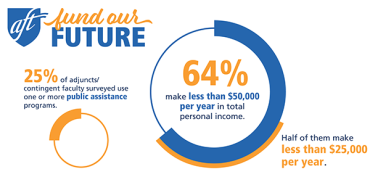A new AFT report reveals that an alarming number of adjunct faculty are scraping by on poverty wages: Nearly 25 percent rely on public assistance to survive, and a whopping 40 percent have trouble covering basic household expenses. The report, “An Army of Temps: AFT 2020 Adjunct Faculty Quality of Work/Life Report,” debunks the idea of college professors as well-established, stably employed and highly-respected intellectuals and unveils the truth: Part-time and contingent faculty are among the most vulnerable workers, members of a gig economy that offers little job security and none of the prestige so often associated with university professors.
These professors are employed “contingent” on factors outside of their control, such as funding and enrollment. Among them, adjuncts, who typically work semester to semester on an as-needed basis, experience the most precariousness, yet colleges and universities rely on them to teach the majority of their classes.
Economic injustice
“This survey paints a vivid portrait of the economic insecurity of adjunct faculty,” says AFT President Randi Weingarten. “Adjuncts anchor their institutions’ instructional work, yet so many are living hand to mouth. It’s sickening, especially when the administrators who employ them continue to rake in record salaries. Adjuncts can’t plan their lives more than a semester ahead, and even those plans are laid to waste when a disaster like the coronavirus hits.”
The report reflects feedback from 3,076 respondents to a survey of contingent faculty conducted in May and June of 2019 at two-year and four-year institutions. It shows the following:
- One-third of respondents earn less than $25,000 annually, placing them below the federal poverty guideline for a family of four;
- Only 15 percent report being able to comfortably cover basic monthly expenses;
- Fewer than half have access to employer-provided health insurance; nearly 20 percent rely on Medicaid;
- About 45 percent have put off getting needed healthcare, including mental health care; 65 percent forgo dental care;
- 41 percent struggle with job security, reporting that they don’t know if they will have a teaching job until one month before the beginning of the academic year;
- For 3 out of 4 contingent faculty, employment is only guaranteed from term to term; and
- A plan for a secure retirement is out of reach for most faculty, with 37 percent reporting they don’t see a path.
The grim numbers are nothing compared with the lived experience individuals endure. “I hear a lot of schools talking about students who are food insecure and housing insecure, but as you see in the report, there are adjuncts who are food insecure, who are housing insecure,” says Bobbi-Lee Smart (pictured at right), an adjunct at several Southern California community colleges and the executive director of Adjunct Faculty United, representing part-time faculty in the North Orange County Community College district. The coronavirus pandemic is only making things worse, she adds. “We already don’t have offices. Now we’re about to lose classes. If you do have healthcare, you are going to lose your healthcare.”
Smart was a panelist during the AFT’s Solidarity Academy webinar about the report, and the pandemic was a primary topic of discussion.
When campuses were shut down in March, for example, many adjuncts were given only hours to move their classes online, often without sufficient training or technical support and frequently with no compensation for their time. Now, they face summer and fall semesters in which enrollment—and therefore their jobs—is in doubt.
“This COVID-19 crisis is really shining a light on structural inequities that we have across our society,” says Anne Wiegard, a United University Professions member who was an adjunct for 11 years and remembers well the “adjunct hell” she describes in this AFT Voices post: “abysmal pay, no benefits, poor working conditions and nonexistent job security.” Today, Wiegard is a full-time, nontenure-track professor at the State University of New York at Cortland, but she is still an adjunct activist. With the pandemic in play, she says, “I am hopeful that our structural inequities that contingent faculty have been fighting so hard to get people to pay attention to will be more obvious to the general public, and we can press for solutions that activists in our movement have been struggling for together, solutions that this report outlines in its recommendations.”
Union focus
The AFT, the largest union of contingent higher ed workers, has been a big part of that fight. “It’s no surprise that adjuncts are fighting back through their unions for voice, respect, job security, proper benefits and higher wages,” says Weingarten. “This is a funding issue as well, which is why the AFT is fighting for federal funds for state and local governments to invest in higher education.”
Over the last four decades, academic labor has shifted dramatically: Once 70 percent of faculty were tenured or on the tenure track, but today, that figure has flipped, as states provide less and less funding and colleges look for ways to cut costs. Contingent faculty now make up 75 percent of faculty, and 47 percent hold part-time positions.
Unions are fighting to address these problems, and the coronavirus pandemic has given them a laser focus. “We’ve been able to think about what our union can do in this triage moment, particularly for the more vulnerable members at our non-collective bargaining schools,” says Daniel Pieczkolon (pictured above), president of United Academics of Philadelphia, a geographic collective of faculty from colleges throughout the Philadelphia area. UAP offers student debt clinics and unemployment workshops to directly address member needs, asking the question, “What can our unions do that our universities should have been doing?”
The AFT’s report will provide data to fuel the fight for fairness. “We have to make sure that people know what adjuncts are, that we exist,” says Smart. “Right now we’re an invisible workforce. People say, ‘well, you’re a professor,’ but I’m a part-time professor. That’s a whole different can of worms.”
[Virginia Myers, AFT Media Relations]



